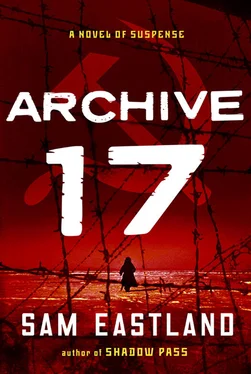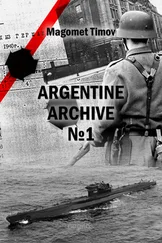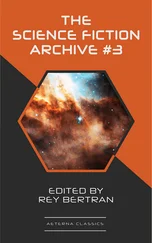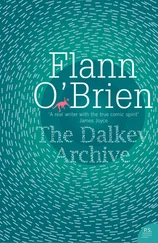Sam Eastland - Archive 17
Здесь есть возможность читать онлайн «Sam Eastland - Archive 17» весь текст электронной книги совершенно бесплатно (целиком полную версию без сокращений). В некоторых случаях можно слушать аудио, скачать через торрент в формате fb2 и присутствует краткое содержание. Жанр: Исторический детектив, на английском языке. Описание произведения, (предисловие) а так же отзывы посетителей доступны на портале библиотеки ЛибКат.
- Название:Archive 17
- Автор:
- Жанр:
- Год:неизвестен
- ISBN:нет данных
- Рейтинг книги:3 / 5. Голосов: 1
-
Избранное:Добавить в избранное
- Отзывы:
-
Ваша оценка:
- 60
- 1
- 2
- 3
- 4
- 5
Archive 17: краткое содержание, описание и аннотация
Предлагаем к чтению аннотацию, описание, краткое содержание или предисловие (зависит от того, что написал сам автор книги «Archive 17»). Если вы не нашли необходимую информацию о книге — напишите в комментариях, мы постараемся отыскать её.
Archive 17 — читать онлайн бесплатно полную книгу (весь текст) целиком
Ниже представлен текст книги, разбитый по страницам. Система сохранения места последней прочитанной страницы, позволяет с удобством читать онлайн бесплатно книгу «Archive 17», без необходимости каждый раз заново искать на чём Вы остановились. Поставьте закладку, и сможете в любой момент перейти на страницу, на которой закончили чтение.
Интервал:
Закладка:
Pekkala suddenly remembered a conversation he’d had with Rasputin many years before. Pekkala sometimes had difficulty in deciphering the musings of the Siberian holy man and even when Rasputin did manage to make himself understood, Pekkala often found it hard to take him seriously. But this time Pekkala wished he had listened more closely.
It was evening. Pekkala walked along a tree-lined boulevard on the outskirts of St. Petersburg. Heat from that summer day still lingered in the air .
Following the odor of frying garlic, Pekkala made his way to a club known as the Villa Rode .
Pekkala was looking for Rasputin, who could be found at this place almost every evening. He did not normally seek out the Siberian mystic. In fact, Pekkala usually went out of his way to avoid Rasputin, but he was the only person that Pekkala knew he could talk to about what he’d seen earlier that day .
The Villa Rode was popular with the St. Petersburg elite because it did not close until sunup. When the famous Streilna restaurant, which resembled a miniature palace made of ice in the middle of Petrovsky Park, shut its doors at two a.m., followed by the Koupeschesky casino club at three a.m., those who were still conscious and had money in their pockets paid a visit to the Villa Rode .
The building’s wooden plank exterior was badly in need of paint. Inside, the rooms were cramped, the tables small and rickety, and the acoustics notoriously strange. It was sometimes possible to hear the whispered conversation of a couple on the other side of the room while having to almost shout to be understood by someone sitting at the same table .
Through the open windows of the Villa Rode came the sounds of laughter and piano music. A deep and slightly drunken voice crooned Sorokin’s song, “As long as I can see the flame, out there in the darkness, I know that I am still alive.”
The Villa Rode had become Rasputin’s favorite haunt for the simple reason that he never had to pay for anything when he was there. His bill was handled by the Tsarina Alexandra from an account set up specially to pay for his food and drink, as well as to cover the costs of the broken chairs, tables, china, and windows which were often the result of his evening entertainment .
Rasputin had been thrown out of so many places that restaurant owners were given a special number to call if they needed him removed from their premises. Once the call had been made, an unmarked car would be dispatched and Rasputin would be hauled away by agents of the Okhrana operating under the direct orders of the Tsarina. Fetching Rasputin was said to be one of the worst duties an Okhrana agent could be assigned. Chief Inspector Vassileyev, head of the St. Petersburg Bureau, reserved it for those men under his command who required an extra dose of humiliation .
Just when it seemed as if the city might be running out of places for Rasputin to disgrace himself, the owner of the Villa Rode, a somber-looking man named Gorokhin, hit upon a brilliant plan which assured him a steady source of income from the coffers of the Romanovs, as well as the gratitude of the Tsarina .
Gorokhin offered to build an extension onto the Villa Rode. This extra room would be for Rasputin alone. It could not be accessed by regular patrons, nor would Rasputin ever be asked to leave the extension, no matter what he did inside it .
No sooner had Gorokhin made his offer than a team of builders arrived from the palace of Tsarskoye Selo to begin construction of the extension. It was completed in forty-eight hours, and since then Rasputin had made it his own .
That night, Gorokhin recognized Pekkala at once, and correctly guessed that he had come to see Rasputin. He led Pekkala out the back of the restaurant, passing through a neglected garden thick with tangled bushes. The air was heavy with the smell of lavender and honeysuckle. At last they arrived at a plain, low-roofed hut which adjoined the Villa Rode .
No noise came from behind the pine door. Nor was there any light glimmering through the shuttered windows .
“Are you sure he’s here?” Pekkala asked .
“He kicked the door down on his way in this morning,” replied Gorokhin. “I had to put up this new one. There have been several visitors since then, but Rasputin himself has not emerged.”
“Is he alone?”
“I doubt it.”
“Thank you,” said Pekkala .
Gorokhin nodded and left .
Pekkala opened the door and walked inside. The air was thick with the smell of sweat and alcohol and the ash of coarse Khorizki tobacco, which Rasputin preferred to the more expensive Balkan cigarettes smoked by his benefactor, the Empress .
The only light came from a single candle melted onto the head of a small brass Buddha. The melted wax had trickled down, coating the belly of the statue .
Searching the gloom, Pekkala could make out a large couch and a low table strewn with bottles. On an upholstered stool sat a man who was definitely not Rasputin. This stranger wore a black wool coat with a velvet collar and clutched a round-topped Homburg hat. His thin-soled shoes were narrow in the toe and highly polished. The man did not glance up at Pekkala, but stared at the floor with a grim expression on his face .
Pekkala had seen that look before, from people who had been caught red-handed at some illegal activity but were too dignified, or too afraid, to run away .
Opposite the man, slumped on a couch with legs spread and bare feet resting on the table, was Rasputin. He wore a silk robe with a Japanese kimono pattern and a belt like a bell-ringer’s rope. “Pekkala,” he said, and the name seemed to crack from his lips like a tiny spark of electricity. Haphazardly, Rasputin began to rearrange his clothes. “Has Chief Inspector Vassileyev finally sent you to arrest me or else”-he gestured vaguely at the man huddled across the table-“is it this gentleman you’ve come to put in chains?”
The man still refused to look up, as if by remaining motionless he might escape detection .
“I am not here to arrest either of you.”
“Thank God for that,” sighed the man in the black coat .
Rasputin lifted one finger and wagged it at the man. “You can go now-and be sure to thank God for that, as well.”
Obediently, the man stood. From the inside pocket of his coat, he removed an envelope and placed it on the table, between Rasputin’s large and hairy feet. “So we have an understanding?”
Rasputin laughed. “I understand you, but that does not mean we understand each other. Come back tomorrow. Bring another envelope.”
“Not without some kind of guarantee,” protested the man. “I wouldn’t dream of it.”
“You will,” Rasputin told him, “and that is all you’ll dream about.”
Too indignant to reply, the man stormed out of the room .
The candle flame shuddered as he passed by and the face of the little Buddha appeared to be laughing at him .
“What was that about?” Pekkala asked Rasputin .
“He is a representative for a jeweler in Petersburg. He is hoping to have a royal warrant bestowed upon his company.”
“And why is he asking you for that?”
“Because he can’t ask anyone else! Least of all the Romanovs.”
“I don’t understand.”
“And that is why I love you, Pekkala.” Rasputin sat forward, lifting his bare feet from the table and planting them firmly on the floor. He picked up the bribe, index finger shuffling through the bills as he counted them. Then he tossed the money back onto the table. “You see, Pekkala, you can’t just ask for the royal warrant. You have to be given it. If you do ask for it, there’s no chance at all of receiving one. Instead, you must give the impression that you would accept it if offered, but that in the meantime, you do not expect anything. That’s the way things work.”
Читать дальшеИнтервал:
Закладка:
Похожие книги на «Archive 17»
Представляем Вашему вниманию похожие книги на «Archive 17» списком для выбора. Мы отобрали схожую по названию и смыслу литературу в надежде предоставить читателям больше вариантов отыскать новые, интересные, ещё непрочитанные произведения.
Обсуждение, отзывы о книге «Archive 17» и просто собственные мнения читателей. Оставьте ваши комментарии, напишите, что Вы думаете о произведении, его смысле или главных героях. Укажите что конкретно понравилось, а что нет, и почему Вы так считаете.











